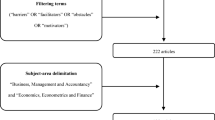Abstract
This research informs our understanding of the technology commercialization process in university spinoffs, focusing in particular on student involvement in the early phases of the spinoff development process and on the impact of the larger university ecosystem. Detailed case studies indicate that graduate and post-doctoral students are important participants in university spinoffs. We offer a typology of spinoff development with four pathways, based on the varying roles of faculty, experienced entrepreneurs, PhD/post-doctoral students, and business students. The effects of the larger university ecosystem, beyond the university technology transfer office and the university’s commercialization policies, are also considered, including an examination of programs and practices that may influence this process. We close with a discussion of guidelines for technology transfer and spinoff development at universities, based on the findings of this research.


Similar content being viewed by others
References
Bradley, S., Hayter, C., & Link, A. (2013). Models and methods of university technology transfer. Foundations and Trends in Entrepreneurship, 9(6), 571–650.
Colyvas, J., Crow, M., Gelijns, A., Mazzoleni, R., Nelson, R. R., Rosenberg, N., & Sampat, B. N. (2002). How do university inventions get into practice? Management Science, 48(1), 61–72. doi:10.1287/mnsc.48.1.61.14272.
Cyranoski, D., Gilbert, N., Ledford, H., Nayar, A., & Yahia, M. (2011). Education: The PhD factory. Nature, 472, 276–279.
Di Gregorio, D., & Shane, S. (2003). Why do some universities generate more start-ups than others? Research Policy, 32(2), 209–227.
Fleming, L., Woodward, Y., & Golden, J. (2010). Science and technology entrepreneurship for greater societal benefits: Ideas for curriculum innovation. In Advances in the study of entrepreneurship, innovation and economic growth, vol. 21; G. D. Libecap, M. Thursby, and S. Hoskinson (Eds.), Spanning boundaries and disciplines: University technology commercialization in the idea age, Emerald Books.
Goldfarb, B., & Henrekson, M. (2003). Bottom-up versus top-down policies towards the commercialization of university intellectual property. Research Policy, 32(4), 639–658.
Grimaldi, R., Kenney, M., Siegel, D. S., & Wright, M. (2011). 30 years after Bayh–Dole: Reassessing academic entrepreneurship. Research Policy, 40(8), 1045–1067.
Hoffer, Thomas, B., Milesi, Carolina, Selfa, Lance, Grigorian, Karen, Foley, Daniel, J., Milan, Lynn M., Proudfoot, Steven L., & Rivers, Emilda B. (2011). InfoBrief SRS: Unemployment Among Doctoral Scientists and Engineers Remained Below the National Average in 2008. National Science Foundation NSF 11-308. http://www.nsf.gov/statistics/infbrief/nsf11308/nsf11308.pdf.
Jain, S., & George, G. (2007). Technology transfer offices as institutional entrepreneurs: The case of Wisconsin Alumni Research Foundation and human embryonic stem cells. Industrial and Corporate Change, 16(4), 535.
Litan, R. E., & Cook-Deegan, R. (2011). Universities and economic growth: The importance of academic entrepreneurship. In The Kauffman Task Force on Law, Innovation, and Growth (Ed.), Rules for growth: Promoting innovation and growth through legal reform. Ewing Marion Kauffman Foundation: Kansas City.
Acknowledgments
The authors gratefully acknowledge the research and editorial assistance of Alyse Freilich, Jared Konczal, and Mette Kramer. This study was supported by the Ewing Marion Kauffman Foundation. The views expressed are those of the authors and do not necessarily reflect the views of the Ewing Marion Kauffman Foundation.
Conflict of interest
The authors declare that they have no conflict of interest.
Author information
Authors and Affiliations
Corresponding author
Rights and permissions
About this article
Cite this article
Boh, W.F., De-Haan, U. & Strom, R. University technology transfer through entrepreneurship: faculty and students in spinoffs. J Technol Transf 41, 661–669 (2016). https://doi.org/10.1007/s10961-015-9399-6
Published:
Issue Date:
DOI: https://doi.org/10.1007/s10961-015-9399-6




